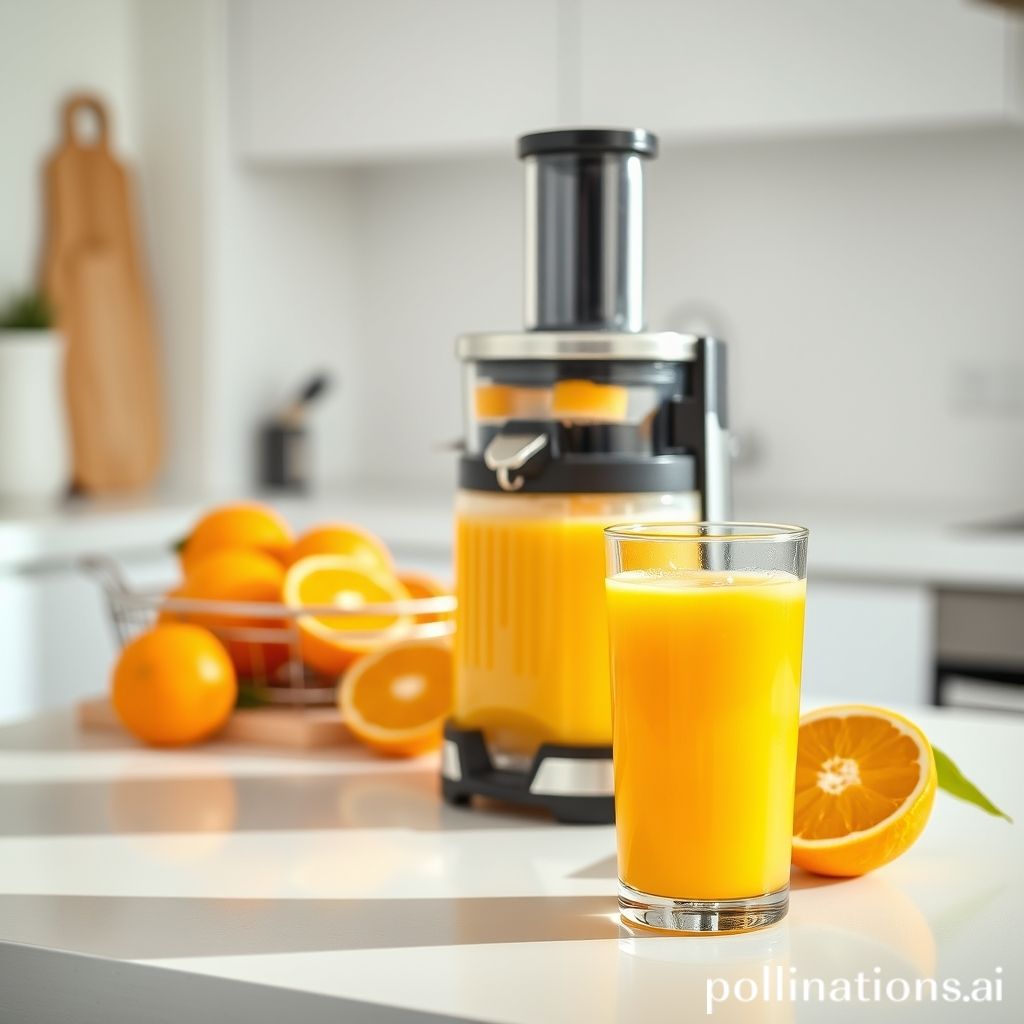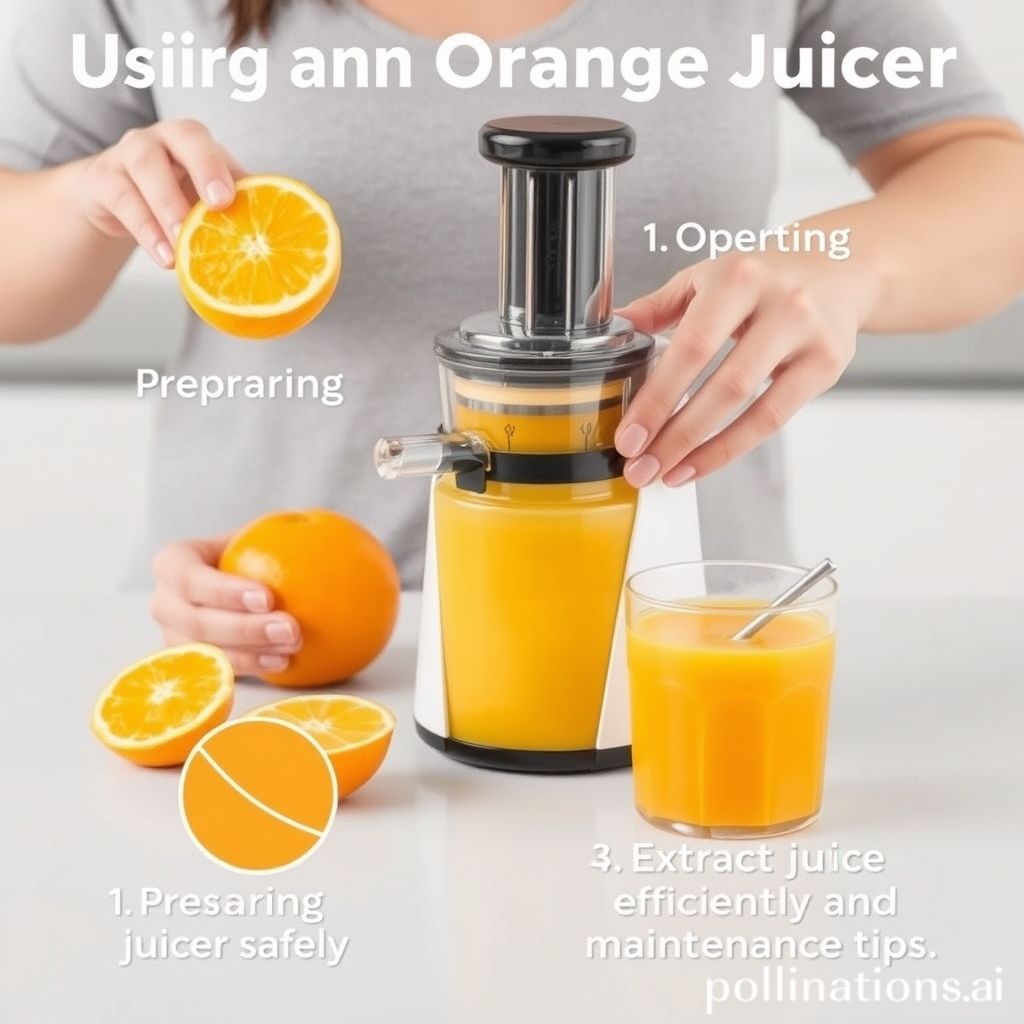What Is The Orange Juicer Called?
[su_note note_color=”#fb8e00″ text_color=”#000000″ radius=”12″]
Orange juicers, also known as citrus juicers, are essential kitchen gadgets specifically designed to extract juice from oranges. These convenient devices come in various types, including manual and electric models, each offering unique features and benefits.
Manual orange juicers require a bit of arm strength, but they are simple to use and easy to clean. Nevertheless, electric orange juicers are more efficient and require less effort, making them ideal for those who frequently enjoy fresh orange juice. Whether you want a quick glass of juice or plan to make larger batches, owning an orange juicer can save you time and effort in the kitchen.
[su_box title=”
[/su_box]

Different Types of Orange Juicers
1. Manual Citrus Press
A manual citrus press is an orange juicer that requires manual pressure to extract the juice. It has a lever or handle that is pressed down on the halved fruit to squeeze out the juice.
Pros: Manual citrus presses are easy to use, affordable, and do not require electricity. They are also easy to clean and maintain.
Cons: Using a manual citrus press can be tiring, especially when juicing large quantities of oranges. It may also result in lower juice yield compared to electric juicers.
2. Electric Citrus Juicer
An electric citrus juicer is a powered device that automates the juicing process. It has a motorized reamer or cone that spins to extract juice from the orange.
Pros: Electric citrus juicers are efficient and require less effort compared to manual presses. They can quickly juice a large quantity of oranges and provide a higher juice yield.
Cons: Electric juicers are more expensive than manual presses and require an electrical power source. They may also be bulkier and more challenging to clean.
3. Commercial Orange Juicer
A commercial orange juicer is designed for heavy-duty use in commercial establishments such as restaurants, cafes, or juice bars. These juicers are often larger and sturdier to handle high-volume juicing.
Pros: Commercial orange juicers are built for durability and can handle continuous juicing without overheating. They can produce large quantities of juice quickly, making them suitable for business settings.
Cons: Commercial juicers are typically more expensive and may require professional installation. They may also take up more space and have complex cleaning processes.
[su_highlight background=”#f6b40f”]Expert Tips: Choose a manual citrus press for occasional use or a commercial orange juicer for high-volume juicing.[/su_highlight]
How to Choose the Right Orange Juicer
1. Considerations for Personal Use
When choosing an orange juicer for personal use, there are a few important factors to keep in mind:
- Frequency of Use: Determine how often you plan to use the orange juicer. If you only make orange juice occasionally, a simpler and more affordable option may be suitable. Nevertheless, if you juice oranges regularly, it may be worth investing in a higher-quality juicer with additional features.
- Budget: Set a budget for your orange juicer purchase. Consider the price range that aligns with your needs and preferences.
- Space Available: Evaluate the space available in your kitchen or wherever you plan to use the juicer. Depending on the size and design of the juicer, it may require a dedicated space on your countertop or storage area.
2. Considerations for Commercial Use
If you need an orange juicer for commercial purposes, such as in a café, restaurant, or juice bar, the following factors are crucial:
- Capacity and Speed: Determine the desired output capacity and speed of the juicer. Commercial establishments often require juicers that can process a large volume of oranges quickly to meet customer demand.
- Durability and Maintenance: Consider the durability of the juicer and the ease of maintenance. Commercial juicers need to withstand frequent use and be easy to clean and maintain to ensure uninterrupted operation.
- Cost-effectiveness: Assess the overall cost-effectiveness of the juicer. At the same time commercial juicers may have a higher price tag, it is important to consider their long-term benefits, such as energy efficiency and reliability.
To make an informed decision, carefully evaluate your specific needs, preferences, and circumstances when choosing the right orange juicer. By considering these factors, you can find a juicer that suits your requirements and provides a satisfying juicing experience.
| Considerations for Personal Use | Considerations for Commercial Use |
|---|---|
| Frequency of use | Capacity and speed |
| Budget | Durability and maintenance |
| Space available | Cost-effectiveness |
Using an Orange Juicer
1. Preparing the Oranges
Before using an orange juicer, it is important to properly prepare the oranges to ensure the best results. Follow these steps:
- Choose Fresh Oranges: Select ripe and juicy oranges for the best flavor and maximum juice yield.
- Wash the Oranges: Rinse the oranges under cool water to remove any dirt or residue.
- Room Temperature: Allow the oranges to reach room temperature for optimal juicing.
- Cut and Peel: Cut the oranges in half and remove any seeds or large pith. You can also peel the oranges if you prefer.
2. Operating the Juicer Safely
Using an orange juicer safely is essential to avoid accidents or injuries. Consider the following safety guidelines:
- Read the Manual: Familiarize yourself with the juicer’s instruction manual before operating it.
- Stabilize the Juicer: Place the juicer on a stable surface to prevent tipping over.
- Use Two Hands: When using the juicer, hold the orange with one hand and apply pressure on the juicer’s handle with the other hand.
- Watch Your Fingers: Be cautious of your fingers and keep them away from moving parts to avoid injuries.
3. Extracting Juice Efficiently
To extract juice efficiently from oranges, follow these tips:
- Choose the Right Setting: Adjust the juicer to the desired pulp level according to your preference.
- Apply Steady Pressure: Firmly press down on the handle to extract the juice, ensuring consistent pressure.
- Rotate the Orange: Rotate the orange In the course of applying pressure to extract juice from all sections.
4. Cleaning and Maintenance Tips
Properly cleaning and maintaining the orange juicer will prolong its lifespan. Consider these tips:
- Unplug and Disassemble: Make sure the juicer is unplugged and disassembled before cleaning.
- Hand Wash Components: Wash the juicer’s components, such as the strainer and juice container, with warm soapy water.
- Remove Residue: Use a brush or sponge to remove any pulp or residue from hard-to-reach areas.
- Dry Thoroughly: Allow all components to air dry completely before reassembling the juicer.

Where to Buy an Orange Juicer
1. Local Kitchenware Stores
If you want to see and feel the orange juicer before buying, local kitchenware stores are a great option. These stores carry a variety of juicer models, allowing you to compare features and prices in person. You can find local kitchenware stores by searching online directories or asking for recommendations from friends and family.
2. Online Marketplaces
Online marketplaces offer a convenient way to purchase an orange juicer from the comfort of your own home. Platforms like Amazon, eBay, and Walmart have a wide selection of juicers, including different brands and models. Read customer reviews and ratings to make an informed decision, and take advantage of competitive pricing and fast shipping options.
3. Directly from Manufacturers
Buying directly from manufacturers can ensure authenticity and get you the best price for your orange juicer. Many manufacturers have their own websites where you can browse their product range, compare specifications, and make a purchase. Additionally, buying from the manufacturer allows you to access customer support and warranty services directly.
When buying an orange juicer, consider factors such as juicing efficiency, ease of cleaning, durability, and price. It’s also worth exploring different types of juicers, such as manual citrus presses, electric citrus juicers, or multipurpose juicing machines that can handle various fruits.
| Information |
|---|
| Compare features and prices |
| Read customer reviews and ratings |
| Consider juicing efficiency, ease of cleaning, durability, and price |
| Explore different types of juicers |
Whether you choose to buy from a local store, an online marketplace, or directly from the manufacturer, owning an orange juicer allows you to enjoy freshly squeezed orange juice whenever you want. Start your day with a glass of nutritious and refreshing orange juice by finding the perfect orange juicer for your needs.
[su_note note_color=”#ea2e0c” text_color=”#ffffff” radius=”8″]Extra Tips: Compare features and prices, read customer reviews, consider juicing efficiency, explore different types of juicers. Start your day with a glass of refreshing orange juice.[/su_note]
Conclusion
The device used to extract juice from oranges, commonly known as an orange juicer, is an essential tool for anyone who enjoys fresh orange juice. Whether you are looking for information on different types of orange juicers, how to use them, or where to purchase one, it is important to understand the value of this device in enhancing your juicing experience.
So why not start enjoying the refreshing and nutritious benefits of fresh orange juice today? Invest in an orange juicer and savor the taste of freshly squeezed oranges whenever you desire.
FAQ: What Is The Orange Juicer Called?
FAQ 1: Can I use an orange juicer for other citrus fruits?
Yes, orange juicers can typically be used for other citrus fruits like lemons, limes, and grapefruits. They are designed to extract juice from various citrus fruits efficiently.
FAQ 2: Is it better to buy a manual or electric orange juicer?
The choice between a manual or electric orange juicer depends on personal preference and convenience. Manual juicers are cost-effective, portable, and require physical effort. Electric juicers, Nonetheless, offer faster and more effortless juicing, but they tend to be pricier.
FAQ 3: How long does it take to juice oranges with an electric juicer?
The time it takes to juice oranges with an electric juicer varies depending on the specific model and the quantity of oranges. Generally, electric juicers can extract juice from oranges in a matter of seconds to a few minutes.
FAQ 4: Can I use an orange juicer for vegetables or other fruits?
Orange juicers are specifically designed for citrus fruits and may not be suitable for juicing vegetables or other fruits. It is recommended to use a separate juicer or a multi-purpose juicer that can handle a wider range of fruits and vegetables.
FAQ 5: Are commercial orange juicers suitable for home use?
Commercial orange juicers are typically designed for high-volume juicing in commercial settings such as restaurants or juice bars. Meanwhile they can be used at home, they might be larger, more expensive, and less practical for personal use. It is advisable to consider smaller and more affordable options specifically designed for home use.
Read Similar Post:
1. Winter Smoothies: A Surprising Twist to Beat the Cold
2. Blend or Juice? Exploring the Versatility of Blenders and Juicers
